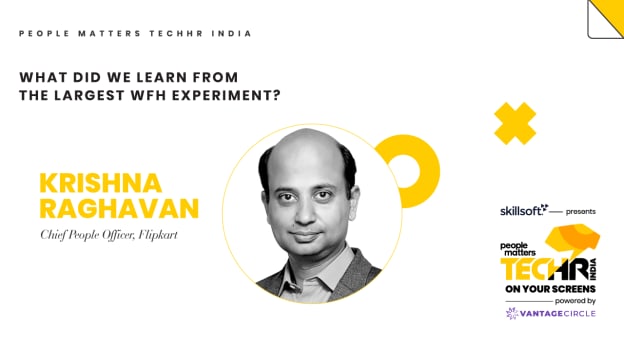What did we learn from the largest WFH experiment?

Krishna Raghavan is Chief People Officer at Flipkart, India’s leading ecommerce marketplace. In his keynote speech at TechHR 2020, Krishna discusses how enterprises can learn from the world's largest working-from-home experiment of all time, what he anticipates in the world of work post-COVID, putting people at the center of policy and what leaders need to do going forwards. Krishna is “a proud flipster” - not only because they “have risen up to serve their customers” during this time, but also due to the fact Flipkart has always been a “people-first organization.”
“This has been so aptly demonstrated in the last few months as they’ve shown character, compassion, and commitment that is much-needed in these times,” he says.
Not only has this been a work-from-home experience, Krishna says, but “it has also been the biggest learning experience for humanity as well.”
When this started, he said, “no one, including the governments across the globe, had a set playbook. There was a cloud of questions, anxiety, apprehensions, ambiguity, and everything else. But there was also hope, empathy, opportunity, and a future to look forward to.”
For Flipkart, even before business got shut down, they had already started issuing an advisory much in advance and made employees work from home mandatorily from March 9th, quite early in the pandemic outbreak. So, what are the five key learnings Krishna and Flipkart have gathered from this extended work-from-home experiment?
Organizations really need to double down on their employee-centricity and demonstrate this in moments that matter, especially the one we are in.
The first priority must be employee wellness. “And when I say wellness, this has to be addressed in an extremely holistic way - physical aspects, mental aspects, and social aspects,” Krisha says. All of Flipkart’s initial actions were centered around ensuring the wellness and safety of their supply chain workforce. “There wasn’t any policy that was set in stone,” Krishna says. “Everything was adaptive and catered to the needs of the employee and the environment they were operating in.”
Listen to your employees actively and intently.
“The best ideas emerge from the most unlikely spaces. It is critical that organizations nurture and promote active participation and dialogue from employees.” Plan actions based on the feedback obtained from employees. Flipkart has been gathering thoughts from employees throughout the pandemic, building strategies and policies based on these insights. According to Krishna, this will continue “indefinitely.”
Employees need to be aware of the challenges the company is facing.
“Take them along on the journey, versus withholding information that might seem negative.” At Flipkart, they share all information about the challenges and field any questions or concerns that come up. “This has often resulted in employees proactively collaborating across diverse functions to solve problems.”
Addressing apprehensions and building assurance
As Krishna points out, every individual may deal with the apprehensions of this situation differently. “Therefore, it becomes a high priority for an organization’s leadership to keep its employees informed and engaged in an extremely transparent manner.” These communications should come from the very top of leadership to every member of the organization, building the trust that is so vital during uncertainty about the future.
How to keep employees at the center of all your strategies
“In design-thinking, it’s all about keeping the customer at the center of your decision making,” Krishna says. “Similarly, you should keep employees at the center as you craft your policies.” In Flipkart’s ultra-diverse workforce, there isn’t a one-size-fits-all policy that applies to anyone of their cohorts. Therefore, Flipkart took “a very thoughtful approach to crafting policies for each of these segments.” For supply-chain segments, Flipkart crafted policy around safety, creating “4000 awareness sessions for these employees in a number of local languages.” Curated responses ensure strategies can be applied most usefully and effectively to the cohorts they’re designed to serve.
“Overall,” Krishna says, “employees need to experience authenticity, empathy and trust in communication and action. If organizations focus on this aspect, employees will rise to face any challenge with courage and conviction.”
Leaders should work on developing their resilience mindset. “Ultimately, the employees at large are looking to their leaders to show strong intent and direction. Once you have these elements at play, teams and individuals will think big, come together with agility and solve any problem that is facing the company.” Leaders who show these traits will be role models for the future, ready to withstand any crisis.
Flipkart’s learnings, while gathered under unprecedented and uncertain circumstances, have been instructive, transformational, and ultimately encouraging.
“This was an experiment for us,” Krishna says, “but it has become an experience.”












